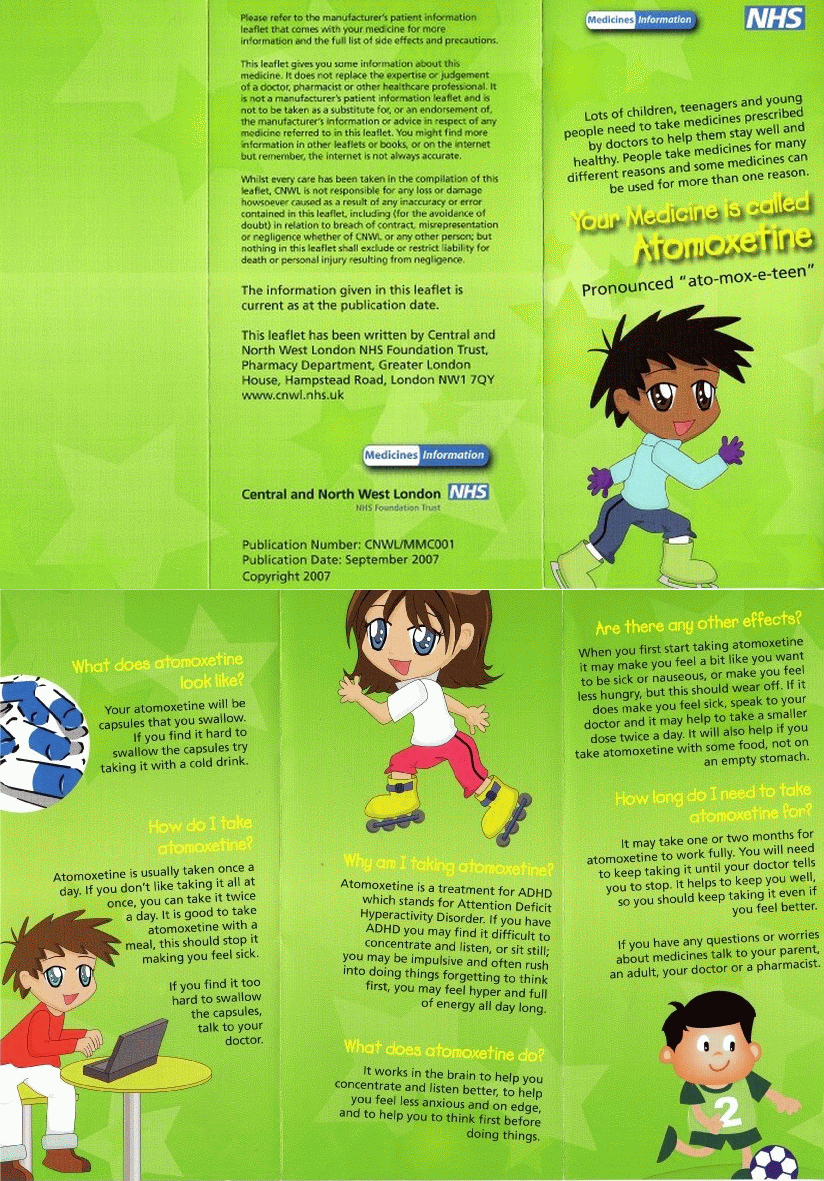

|
|
Your Medicine is called Atomoxetine British National Health Service leaflet, 2007. Medicines ~ Information NHS Your Medicine is called Atomoxetine Pronounced "ato-mox-e-teen" Lots of children, teenagers and young people need to take medicines prescribed by doctors to help them stay well and healthy. People take medicines for many different reasons and some medicines can be used for more than one reason. What does atomoxetine look like? Your atomoxetine will be capsules that you swallow. If you find it hard to swallow the capsules try taking it with a cold drink. How do I take atomoxetine? Atomoxetine is usually taken once a day. If you don't like talking it all at once, you can take it twice a day. It is good to take atomoxetine with a meal, this should stop it making you feel sick. If you find it too hard to swallow the capsules, talk to your doctor. Why am I taking atomoxetine? Atomoxetine is a treatment for ADHD which stands for Attention Deficit Hyperactivity Disorder. If you have ADHD you may find it difficult to concentrate and listen, or sit still; you may be impulsive and often rush into doing things forgetting to think first, you may feel hyper and full of energy all day long. What does atomoxetine do? It works in the brain to help you concentrate and listen better, to help you feel less anxious and on edge, and to help you to think first before doing things. Are there any other effects? When you first start taking atomoxetine it may make you feel a bit like you want to be sick or nauseous, or make you feel less hungry, but this should wear off. If it does make you feel sick, speak to your doctor and it may help to take a smaller dose twice a day. It will also help if you take atomoxetine with some food, not on an empty stomach. How long do I need to take atomoxetine for? It may take one or two months for atomoxetine to work fully. You will need to keep taking it until your doctor tells you to stop. It helps to keep you well, so you should keep taking it even if you feel better. If you have any questions or worries about medicines talk to your parent, an adult, your doctor or a pharmacist. Please refer to the manufacturer's patient information leaflet that comes with your medicine for more information and the full list of side effects and precautions. This leaflet gives you some information about this medicine. It does not replace the expertise or judgement of a doctor, pharmacist or other healthcare professional. It is not a manufacturer's patient information leaflet and is not to be taken as a substitute for, or an endorsement of, the manufacturer's information or advice in respect of any medicine referred to in this leaflet. You might find more information in other leaflets or books, or on the internet but remember, the internet is not always accurate. Whilst every care has been taken in the compilation of this leaflet, CNWL is not responsible for any loss or damage howsoever caused as a result of any inaccuracy or error contained in this leaflet, including (for the avoidance of doubt) in relation to breach of contract, misrepresentation or negligence whether of CNWL or any other person; but nothing in this leaflet shall exclude or restrict liability for death or personal injury resulting from negligence. The information given in this leaflet is current as at the publication date. This leaflet has been written by Central and North West London Mental Health NHS Trust, Pharmacy Department, Greater London House, Hampstead Road, London, NW1 7QY www.cnwl.nhs.uk Central and North West London NHS Foundation Trust Publication Number: CNWL/MMC001 Publication Date: September 2007 Copyright 2007 |
|
regarding NHS children's leaflets posted at bonkersinstitute.org From: Eccles Sue (Central and North West London NHS Foundation Trust) sue.eccles@nhs.net To: methodius@bonkersinstitute.org Date: Mon, Nov 2, 2009 at 11:53 AM Subject: Our Patient Information Leaflets I have been informed that you are using our leaflets on your web-site. Whilst I think your intention is to draw attention to the material which is available for patients and their parents/carers (I have read your end-piece about copyright) you have nevertheless uploaded the whole text of our leaflet. Could I please request that you amend the site so that it is no longer possible to access the whole leaflet -- the front page and our contact details would be appropriate. I'm sure you appreciate that the only way that we will be able to produce more materials for patient benefit is by recouping the cost from other organisations which want to use them -- our objective is provide written materials to support the verbal counselling given by healthcare professionals -- they are not meant to stand alone as sources of information. We charge a reasonable fee for full access to all the children's leaflets and so it not in our interest, or necessarily, patients and parents to have access to them on your website without the professional support intended. I hope this explanation makes sense to you and that you will amend your site quickly. I would appreciate your response and compliance with this request as soon as possible. Sue Eccles Deputy Chief Pharmacist Central and North West London NHS Trust Greater London House Hampstead Road LONDON NW1 7QY Tel. 020 3214 5898 |